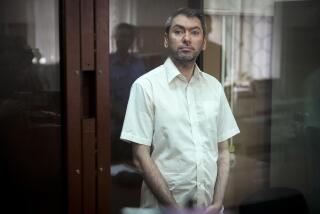Sakharov Calls for Soviet Troop Cutbacks
- Share via
WASHINGTON — Soviet human rights activist Andrei D. Sakharov called on the leaders of his nation Tuesday to unilaterally reduce the Soviet Union’s 5-million-strong armed forces to improve the atmosphere of trust between East and West.
The outspoken physicist, accepting the $50,000 Albert Einstein Peace Prize, also proposed that the West drop its doctrine calling for a nuclear first strike in the event of an attack by Soviet conventional forces against Europe.
Even a large-scale reduction of Soviet troops would “in no way jeopardize the security of the Soviet Union,” he said in a message pointedly addressed to his government. He noted that the Soviet military is already larger than the combined armed forces of the three most powerful Western nations.
The critical advice from Sakharov, who is on a three-week visit to the United States, drew applause from the luncheon audience at the awards ceremony.
Sakharov said that he has been trying to think of ways to improve the climate of trust and cooperation between Moscow and the West after years of mistrust that he attributed to the crimes of the Stalin Era in the Soviet Union.
“I came to the conclusion that the best thing for us to do--for the Soviet side to do--would be a unilateral reduction of military forces. . . ,” he said.
Of the West’s defense posture, Sakharov, who is known as the father of the Soviet hydrogen bomb, said that U.S. support for a first-strike nuclear policy is dangerous and shortsighted.
Sakharov argued that any use of nuclear weapons is certain to escalate into a world calamity.
“This (first-strike) doctrine can create only a deceptive and false notion of security,” he said. Soviet President Mikhail S. Gorbachev has called for a no-first-strike nuclear policy, but it has been rejected by both Democratic and Republican administrations on grounds that the current policy serves to deter a conventional attack.
Shorter Service
Sakharov suggested that the Soviet cutback in military manpower should “begin with a curtailment of the term of military service.”
Soviet law now requires two years’ military service from every male between the ages of 18 and 28, and these draftees now make up about 3 million of the 5 million men under arms.
Sakharov, who was allowed to visit the United States for the first time to attend meetings of the International Foundation for Survival and Development of Mankind in Washington, also continued his sharp critique of Gorbachev’s recent tactics in reforming the government.
Gorbachev is making internal changes at “breakneck speed,” Sakharov contended. He argued for a more deliberate approach.
Alluding to Gorbachev-backed proposals to create a new legislative body and to give vastly expanded powers to its president, Sakharov said: “It is regrettable that changes of such magnitude are being done at such breakneck speed without opportunity for discussion and citizen participation.
“What is essential is a sufficient amount of time to discuss the issues and a referendum on all the major issues.”
Ill-conceived moves made in haste could risk “putting an entire nation under threat of extinction,” Sakharov said.
He said that he is aware that American states regularly decide a variety of issues by referendum, adding that in the recent U.S. elections, “I had an opportunity to visit a polling place and was struck by the activity and commitment of people who came to vote.”
After his address, the winner of the Nobel Peace Prize picked up a $5,000 award for his human rights activities from the AFL-CIO.
The AFL-CIO prize, named for the late labor leader George Meany, was awarded in 1986, but Sakharov was not allowed to leave the Soviet Union to receive it because he was in internal exile as punishment for his criticism of the Soviet invasion of Afghanistan.
More to Read
Sign up for Essential California
The most important California stories and recommendations in your inbox every morning.
You may occasionally receive promotional content from the Los Angeles Times.













